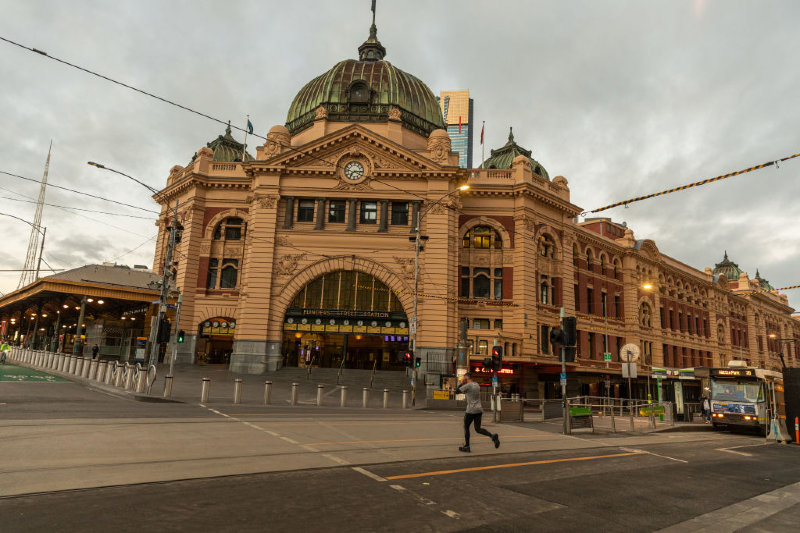Extract from Eureka Street
- Justin Glyn
- 25 August 2020
It is now fairly trite to talk about these ‘exceptional’ times in relation to COVID-19. Isolation, quarantine, mask-wearing, working from home have all become buzzwords. The disruption the pandemic has wrought in all of our lives has been immense. With disruption, however, has come a consciousness that many of the social structures and assumptions we have taken for granted for so long are not, in fact, graven in stone.

Others have pointed out how the pandemic has lit up the areas in which our neoliberal economies are basically unfit for the purpose of providing healthy and safe environments — whether it be privatised aged care homes and quarantine services or ‘the gig economy’, which forces sick people to ‘soldier on’ infecting people as they go. One area that has been rather less considered, however, is disability.
On the one hand, COVID-19 has been a scourge which has affected people with disabilities more than others. As the Disability Royal Commission has been hearing, group homes and ‘special’ schools have been afflicted with the same combination of malign neglect, no government planning and low wage workers as aged care facilities. As with older people, people with disabilities are often at higher risk from complications from COVID-19 and in need of the kind of close-up physical assistance which puts them and others at increased risk of contagion.
Coupled with this has been the damaging reporting on disability which often strikes an openly eugenicist tone. Warnings that economic lockdown will do more damage than the virus and demands for open borders often carry an implicit (indeed sometimes explicit) subtext that some will die for the good of the rest and that the ‘useless eaters’ (as the Nazis described us) should be sacrificed. Indeed, years before the pandemic struck, the former social services minister and the largest media empire in the country were on record as referring to money spent on people with disability as a ‘burden’.
On the flip-side, there is the undeniable fact that some things have become easier if you have a disability. I, for one, am glad that I do not have to take the train to work anymore and brave the inaccessible horror that is Flinders Street Station. No longer do I need to scurry from platform to platform trying to find out from bemused station-workers (who often know as much as I do) when/where/if the scheduled train is arriving.
People who were previously refused accommodations to work from home are now mandated to use them as a result of lockdown regimes. People who previously found that they could not gain access to food or basic necessities now find that online shopping and food delivery are becoming the norm.
'All of these changes — both the bad and the good — suggest that the virus is shining a light on the hidden assumptions and structures behind the world of disability in the same way as it is doing in other economic and social spheres.'
These more positive developments seem to vindicate the so-called ‘social’ model of disability. This sees disability as a problem resting in society, rather than the individual. On this reading of disability, the inability of a blind person to access great literature or of a wheelchair user to enter a building is seen as lying in society’s inability to provide the work in accessible format or to provide an entry ramp. This contrasts with the older ‘medical model’ which sees disability as the individual’s problem: ‘If you could only see/hear/walk etc, then you could be part of society.’ Given that you can’t, society is closed to you.
Now that many (with an obvious disability or not) are now provided with accommodations, doors previously shut are beginning to people with disability. Society has moved to accommodate the needs of the able-bodied and — by a sidewind — has included those with disabilities, where such inclusion was previously deemed impossible.
All of these changes — both the bad and the good — suggest that the virus is shining a light on the hidden assumptions and structures behind the world of disability in the same way as it is doing in other economic and social spheres. The quarantine and aged-care debacles are showing the limits of a venal economy based on greed and private profits from the delivery of essential government services.
In the same way, the open voicing of eugenicist arguments even while societies are forced to provide accommodations that people with disabilities have fruitlessly been demanding for decades reveals how much of a social choice the exclusion of disabled people really is. On balance, this has to be a good thing. If things previously hidden can now be openly discussed, perhaps they can also be changed.
 Fr
Justin Glyn SJ has a licentiate in canon law from St Paul University in
Ottawa. Before entering the Society he practised law in South Africa
and New Zealand and has a PhD in administrative and international law.
Fr
Justin Glyn SJ has a licentiate in canon law from St Paul University in
Ottawa. Before entering the Society he practised law in South Africa
and New Zealand and has a PhD in administrative and international law.
No comments:
Post a Comment